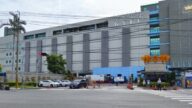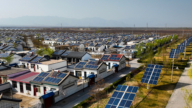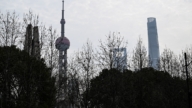【新唐人2014年06月14日訊】中國經濟放緩,仍然是全球關注的焦點。日前,世界銀行經濟學家警告,雖然中國經濟今年增長「預計」將達7.6%,但「硬著陸」風險還是存在。經濟學家指出,目前中共採取的「微刺激」,可能使經濟陷入兩難境地,而想要阻止經濟下滑,應該把錢分給老百姓個人,增加內需。
據英國廣播公司《BBC》中文網報導,世界銀行項目主管伯恩斯(Andrew Burns),6月10號在倫敦表示,中國經濟「硬著陸」風險仍然存在,雖然中國的經濟決策者正試圖調整中國經濟的增長模式:從出口導向轉向內需拉動,但過去兩年的經驗表明,這個過程中的不協調性被進一步突出。
伯恩斯認為,中國的經濟處於「兩難」境地。伯恩斯說,為了進行調整,政府需要將錢從企業移到個人,增加個人收入等。不過如果這樣做,企業的利潤就會受到損失,讓他們的還貸能力變弱。
旅美經濟評論家馬傑森:「不是從企業挪到個人,是從國家挪到個人,中國的問題是國富民窮,一個社會是靠百姓的消費才能最優的配比社會,最優推動經濟發展,中國靠政府投資把基礎建設搞上去後,接著進一步投資,基礎設施的回報就越來越低,變成了一種靠吃補藥活著的狀態。」
據世界銀行的數據,2010年,世界主要發達國家的人均收入,佔人均GDP的比重在60%以上,如美國為79.80%,英國為78.10%,法國為61.02%,日本為81.54% 。
旅美經濟評論家馬傑森指出,中共用龐大的稅收把錢聚集到中央的同時,採取極其低廉的社會保障體系,民眾的生活得不到良好的照顧,當局再通過控制土地,任意調整土地價格,來攫取民眾為購房省下來的錢。馬傑森說,在過去十幾年,雖然中國的國內生產總值(GDP)表面上在快速增長,但是老百姓的收入,佔GDP的比重,卻在逐年下降。
北京清華大學經濟管理學院教授楊斌:「(中國)國家GDP增長那麼多,老百姓收入佔的比重,佔10%以下,佔的非常低,它是收到國庫去了,物價高、工資低,手裡沒錢,怎麼消費!消費能力不足經濟怎麼循環啊?現在已經危機重重了。」
今年中國的經濟大幅度放緩,不僅大幅低於預期,還創下4年多來的新低。被納入所謂「克強指數」的經濟指標——發電量,也創下去年5月以來的新低。固定投資、房地產、出口數據以及社會融資,全部遠遠低於預期。
經濟的快速冷卻,促使中共再度施以「微刺激」提振經濟。中共國務院確定55項工作重點,要求加快重點投資項目前期工作和建設進度,並及時撥付預算資金。
伯恩斯指出,再次刺激投資和轉向消費驅動型經濟的目標矛盾。
楊斌:「現在我認為下一步是,國家對民營企業降息、降稅,對民間工資的增漲關注。」
馬傑森:「中國經濟問題是中國政治問題的延伸,誰都知道中國問 題的真正解決方案是內需,真正靠老百姓、靠企業的自主,創造下一步經濟上一個臺階,但是是不可能的,中共整個經濟實際上是靠一系列利益集團把持的,這個利益集團包括中央政府,包括地方政府、包括各大央企、包括其他一些擁有一定政治優惠的部門,這些利益集團它是絕對不可能放棄它現在擁有的利益的。」
北京「清華大學經濟管理學院」教授楊斌指出,解決中國的經濟問題並不難,只要把錢還給老百姓,讓老百姓有錢消費就能解決問題。
評論指出,中共寧願拿錢搞面子工程、支援非洲,也不願意還民眾錢。據網友估計,「神舟九號」太空船上天,光燃料就花掉600多億人民幣。楊斌說,蘇聯就是前車之鑑,當年蘇聯崩潰之前,正是把錢都投在尖端的國防、科技上,最後拖垮了蘇聯的經濟。
採訪編輯/劉惠 後製/黎安安
Expert Advice to Avoid Hard Landing in Mainland
Economic Cycle
China’s economic slowdown is still the focus of global attention.
Recently, World Bank economists warned that the hard landing
risk still exists although China’s economic growth is expected
to reach 7.6 percent this year.
The economists point out that micro-stimulation from
the Chinese Communist Party (CCP) may cause a dilemma.
To stop the economic downturn, they should increase domestic
demand by giving money to the people.
According to the BBC Chinese network report,
World Bank project manager Andrew Burns said
on June 10th in London, although China’s economic
policy makers are trying to adjust the economic growth mode
by shifting from export-oriented to domestic demand,
the economic hard landing risk still exists.
Based on past two years’ experience, the incompatibility
in this process is further highlighted.
Burns believes that China is facing a dilemma:
that the government needs to increase personal
income instead of enterprise income
to adjust the economic situation.
However, corporate repayment ability will weaken
and business will suffer losses after adjustment.
US-based economic commentator Ma Jiesen:
“It’s not moved from business or government to individuals.
China is a land of extremes of wealth and poverty.
Society relies on people’s spending to achieve distribution.
This way economic growth can best be realized.
China depends on continuous central investment to boost
infrastructure with diminishing returns.
In the end they have to find another way to survive."
According to World Bank data, in the world’s major developed
countries of 2010, the per capita income accounted for more
than 60% of per capita GDP: it was 79.80% in US; 78.10% in
UK; 61.02% in France; 81.54% in Japan.
Economic commentator Ma Jiesen pointed out that the CCP
centralized finance by heavy taxes and a poor
social security system meaning people’s lives are not
well taken care of.
The authorities recoup people』s saving from house purchase by
arbitrarily adjusting land price.
Although, China’s gross domestic product (GDP)
is growing fast; the people’s income as a proportion of GDP
has declined year by year.
Yang Bin, Economics and Management School Professor
Beijing Tsinghua University: “the people』s income is fairly
low – less than 10% compared to GDP.
The money might be in the national treasury.
How can consumption increase with high prices and low pay?
How can the economic cycle run with a shortage of
consumption capacity?
The crisis is layer after layer now. “
The big slowdown in China’s economy is not only significantly
lower than expected but at a new record low in four years.
Electricity generation included in economic indicators —
the Keqiang Index also hit a new low from last May.
Fixed investment, real estate, export data, and social financing
are all far below expectations.
Fast economic cooling prompted the CCP once again to use
micro-stimulus to boost the economy.
The CCP State Council confirmed 55 key projects.
The state council requested the acceleration of the preparatory
work, construction progress, and timely disbursement
of budgeted funds.
Burns pointed out the goals of investment stimulation and
a shift to a consumption-driven economy are contradictory.
Yang: “I believe it』s correct to lower interest and rates to
private enterprise as a next step.
They should pay attention to increasing people』s wage."
Ma Jiesen:
“China’s economic issue is an extension of the political.
Everyone knows the solution lies in domestic demand which
relies on people and enterprises stepping to a new economic
level autonomously.
However, it is impossible.
China’s economy is dominated by a series of interest
groups including central government, local government,
central enterprises and other sectors with certain
political concessions.
It’s impossible for these interest groups to give up their own interests."
Professor Yang Bin pointed out that it’s not hard to solve
the economic problem as long as money is given back to the
people and let them consume.
It’s commented that the CCP would rather give money to
face-saving projects to support Africa, rather than the people.
It’s estimated to take 60 billion RMB fuel to send No.9 Shenzhou
spacecraft into space.
Yang Bin said :"the Soviet Union is an instructive precedent.
Before the collapse of the Soviet Union, they invested money
in cutting-edge defense and technology which dragged
down the Soviet economy."
Interview/Edit/Liu Hui Post-Production/Li AnAn





























